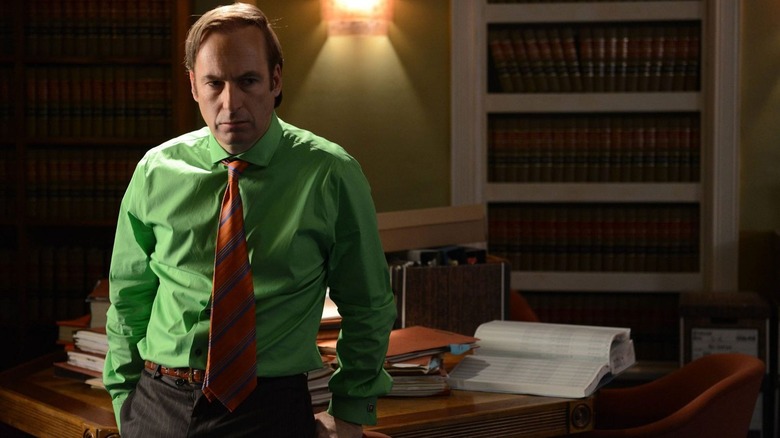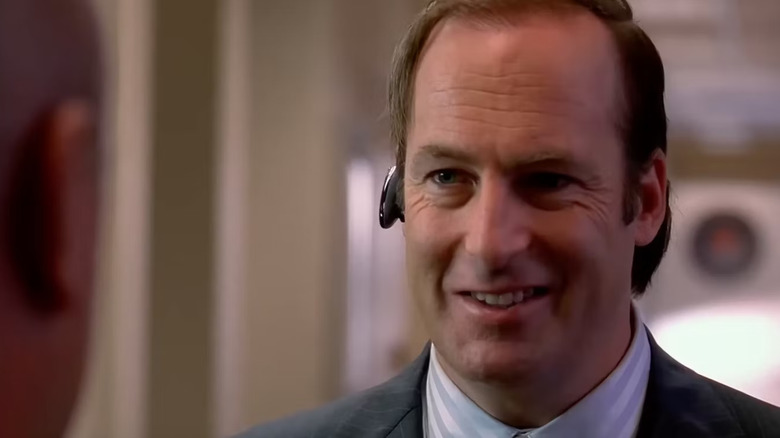The thing about the brutal world of methamphetamine trading on Breaking Bad is that there was never any guarantee that the characters would survive. Series creator and showrunner Vince Gilligan and the writing team considered killing off major characters quite often. For example, they first plotted to kill off Jesse (Aaron Paul) at the end of season 1, and famously considered killing off Skyler (Anna Gunn) in season 5. The show would have been very different without Jesse, the true heart and soul of the series. So killing him off would have been a huge mistake, and killing off Skyler would have been unnecessary. Thankfully, the writing team ultimately made the right choice and saved both characters from the brink of extinction.
While we were working on the final season and coming up with the big finale, there was another character that was almost killed off, Saul Goodman, played by Bob Odenkirk. Saul was one of the best characters on the show and even had a prequel series, Better Call Saul, so killing him off would have had a huge impact. To be honest, it would have not only affected Better Call Saul, but it would have upset a lot of fans. So, it’s great that Saul was saved, but why did Gilligan want to kill him off in the first place?
In a 2014 interview Entertainment WeeklyWhile Gilligan explained why he tried to kill off Saul and why he decided to kill off Walter (Bryan Cranston) instead, it’s interesting to think about just how different “Breaking Bad” and “Better Call Saul” could have been.
Saul almost died in the final episode of Breaking Bad.
The Breaking Bad writing team debated repeatedly whether to go with the carnage or keep it a little more muted. Gilligan even said that at one point they “discussed killing off all the major characters in a Wild Bunch-style massacre ending.” They ultimately realized that while dramatic, that ending didn’t necessarily serve the story, so they decided to back off a bit. And as for Saul, they realized his character just didn’t make sense. Gilligan explained:
“Saul Goodman is like a cockroach in a way, in the sense that he probably survived all of the nuclear war and is still around somewhere after humanity is wiped out. He’s a survivor, so it would be weird if he didn’t survive. Whereas Walter White was sentenced to death in the first act of the first episode. It might be unsatisfying if he wasn’t dead at the end of it all.”
The death of Walter, the chemistry teacher turned methamphetamine kingpin, was the only moment that brought Gilligan to tears, and his death at the end of the series was absolutely necessary to give Walter’s story closure, but there was a lot more to Saul than his cockroach-like ability to survive almost anything.
There’s no reason to kill Saul Goodman.
Gilligan acknowledged that the effect killing off Saul would have on Better Call Saul was a “factor” in his decision to keep him alive, but the bigger problem was that he couldn’t think of a really good reason or way to kill Saul. There wasn’t a magic moment where everyone agreed on the perfect way to kill Saul that would be meaningful and narratively satisfying, so he thought “why bother?”
He also pointed out that just because a character appeared on “Better Call Saul” doesn’t mean they’ll survive “Breaking Bad.” Of course, Mike (Jonathan Banks) had a major role in the prequel series, but Murdered “Sent to Belize” in season five’s best episode, “Say My Name.” Characters appear in “Breaking Bad,” “Better Call Saul” and the sequel, “El Camino,” with many dying in “Breaking Bad” long before appearing in “Better Call Saul” (don’t worry if you don’t know the timeline; we’ve got a primer on that).
I’m glad they didn’t kill Saul because it would have cast a dark shadow over Better Call Saul that would have been hard to ignore. That series is so great. And like Gilligan said, Saul is a survivor, a cockroach, the type of guy who would never give in to Walter White.






![Lesbian Dating Techniques for Texting: carry out””s & Dont””s [Updated 2023] Lesbian Dating Techniques for Texting: carry out””s & Dont””s [Updated 2023]](https://i2.wp.com/is2-ssl.mzstatic.com/image/thumb/Purple111/v4/15/5b/a7/155ba7f1-cdd0-bd93-7b64-01c390640835/source/512x512bb.jpg?w=150&resize=150,150&ssl=1)
